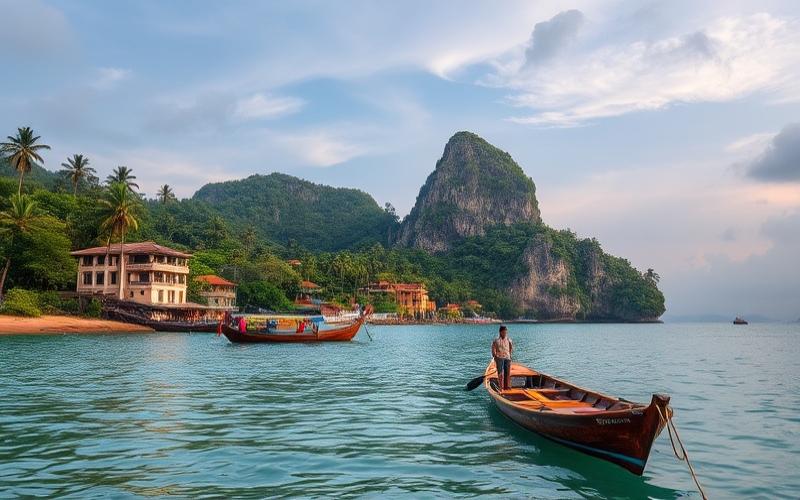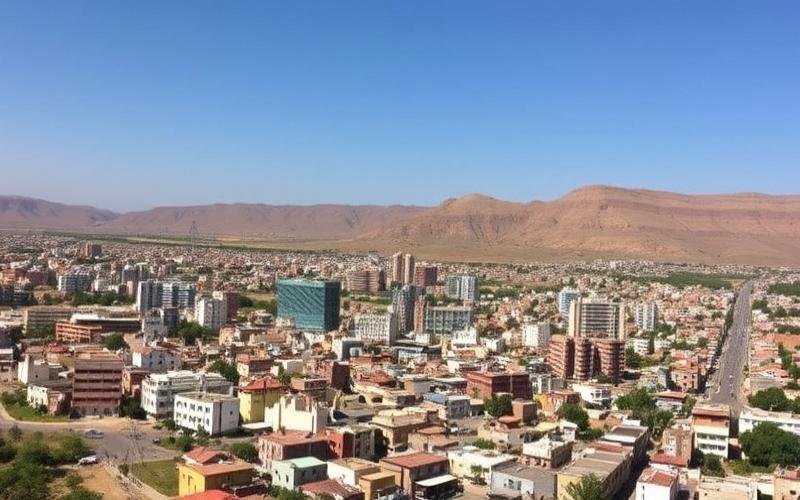
 Published on and written by Cyril Jarnias
Published on and written by Cyril Jarnias
Sri Lanka, with its paradise beaches, rich culture, and historical heritage, is attracting more and more foreign investors to the real estate sector. However, obtaining real estate financing in this tropical country can prove complex for non-residents. In this article, we will explore real estate financing possibilities in Sri Lanka for foreigners, the necessary documents, and the requirements to bring your investment project to fruition.
Can foreigners really get a real estate loan in Sri Lanka?
The answer is yes, but with certain restrictions. The Sri Lankan government has established specific regulations regarding real estate acquisition by foreigners. These rules also apply to real estate financing.
Since 2013, foreigners can no longer purchase land in Sri Lanka, except in certain special cases. However, it is still possible to acquire apartments located above the 4th floor of a building. This restriction aims to protect agricultural land and encourage vertical development in urban areas.
Regarding financing, Sri Lankan banks are generally reluctant to grant real estate loans to foreigners. Nevertheless, some financial institutions offer financing options tailored to non-residents, although the conditions are often stricter than for Sri Lankan citizens.
- Commercial Bank of Ceylon
- Hatton National Bank
- Sampath Bank
- HSBC Sri Lanka
These banks typically offer loans covering up to 60-70% of the property value, with variable interest rates depending on the borrower’s profile and market conditions.
Good to know:
Although financing options are limited for foreigners in Sri Lanka, it is still possible to obtain a real estate loan from certain local banks. It is recommended to contact several institutions to compare offers and find the solution best suited to your situation.
The Perfect File: Essential Documents for Your Loan Application
To maximize your chances of obtaining real estate financing in Sri Lanka as a foreigner, it is crucial to prepare a complete and solid file. Here is the list of documents generally required by Sri Lankan banks:
- Valid passport
- Residence visa or work permit in Sri Lanka (if applicable)
- Proof of address in your home country
- Bank statements from the last 6 months
- Income statements from the last 2 or 3 years
- Salary certificate or employment contract
- Proof of assets (investments, real estate properties, etc.)
- Sales agreement or preliminary contract
- Property valuation by a certified expert
- Apartment plan and compliance certificate
- Recommendation letter from your bank in your home country
- Credit history (if available)
- Business plan or investment project (for commercial loans)
It is important to note that some documents will need to be translated into English and sometimes certified as true copies. It is recommended to check with the chosen bank for specific documentation requirements.
Additionally, Sri Lankan banks place great importance on the applicant’s financial stability and repayment capacity. Therefore, make sure to present strong financial documents demonstrating your creditworthiness and ability to meet loan payments.
Good to know:
Meticulous preparation of your loan application file is crucial to increase your chances of obtaining real estate financing in Sri Lanka. Do not hesitate to seek help from a local lawyer or financial advisor to ensure your file is complete and compliant with local requirements.
Keys to Success: Essential Conditions for Securing Your Financing
Obtaining a real estate loan in Sri Lanka as a foreigner requires meeting certain specific conditions. Here are the main criteria that Sri Lankan banks consider when evaluating your financing application:
1. Financial Stability and Income
Banks generally require that the borrower has stable and sufficient income to cover loan payments. The debt-to-income ratio should not exceed 40-50% of monthly income. Income from abroad is generally accepted, but it must be regular and verifiable.
2. Personal Contribution
Most Sri Lankan banks require a personal contribution of at least 30-40% of the property value. This contribution demonstrates your financial commitment and reduces the bank’s risk.
3. Age and Loan Term
The maximum age for obtaining a real estate loan in Sri Lanka is generally set at 60-65 years. The loan term can vary between 15 and 25 years, depending on the borrower’s age at the time of application.
4. Collateral
The real estate property itself serves as the primary collateral for the loan. However, banks may require additional guarantees, such as financial assets or other real estate properties, especially for foreign borrowers.
5. Insurance
Life insurance and home insurance are generally mandatory to obtain a real estate loan in Sri Lanka. These insurances protect both the borrower and the bank in case of unforeseen events.
6. Credit History
Although credit history in your home country is not directly applicable in Sri Lanka, banks appreciate borrowers with good credit records. If possible, provide evidence of your financial reliability.
7. Viable Investment Project
If you are purchasing a property for investment purposes, banks may request a detailed business plan demonstrating the project’s potential profitability. This may include rental income projections or real estate development plans.
8. Legal Compliance
Ensure that your real estate purchase project complies with Sri Lankan laws on foreign ownership. As mentioned earlier, foreigners can generally only purchase apartments located above the 4th floor.
9. Local Bank Account
Opening a bank account in Sri Lanka is often necessary to facilitate transactions related to the loan and payment of installments.
10. On-site Presence
Although not always mandatory, your physical presence in Sri Lanka during the loan application process can greatly facilitate matters. This allows you to meet directly with loan officers and respond quickly to any requests for additional information.
Good to know:
The conditions for obtaining a real estate loan in Sri Lanka for foreigners are stricter than for local residents. Meticulous preparation, a strong financial situation, and a good understanding of the local real estate market are essential to increase your chances of success.
Tips to Optimize Your Chances of Obtaining Real Estate Financing in Sri Lanka
To maximize your chances of obtaining a real estate loan in Sri Lanka as a foreigner, here are some additional tips:
1. Hire a Local Lawyer
Engaging a Sri Lankan lawyer specialized in real estate law can greatly facilitate the process. They can guide you through legal complexities, verify your project’s compliance, and help you prepare your loan application file.
2. Build a Relationship with a Local Bank
Open a bank account in Sri Lanka and start making regular transactions there. This can help you establish a trust relationship with the bank, which could facilitate obtaining a loan later.
3. Consider a Partnership with a Sri Lankan Resident
If you encounter difficulties obtaining financing as a foreigner, you might consider forming a partnership with a Sri Lankan resident. This can facilitate access to financing, but make sure to properly structure the agreement and consult a lawyer to protect your interests.
4. Explore International Financing Options
If Sri Lankan banks cannot meet your needs, consider obtaining financing in your home country or from international financial institutions specialized in cross-border real estate loans.
5. Be Patient and Persistent
The process of obtaining a real estate loan in Sri Lanka can be long and complex, especially for foreigners. Be patient, maintain regular contact with your bank, and promptly provide any additional information requested.
Good to know:
Obtaining real estate financing in Sri Lanka as a foreigner can be a complex process, but not impossible. A strategic approach, good preparation, and patience are the keys to success in your real estate investment project in this beautiful country.
Conclusion: Realizing Your Real Estate Dream in Sri Lanka
Investing in real estate in Sri Lanka can be an exciting opportunity for foreigners, offering both attractive return potential and the possibility of owning property in a country with exotic charm. Although the process of obtaining real estate financing may seem complex, it is not insurmountable with proper preparation and the right resources.
- Foreigners can obtain real estate loans in Sri Lanka, but with restrictions
- Complete documentation and a strong financial situation are essential
- Loan conditions are generally stricter for non-residents
- Help from a local lawyer and financial advisor can greatly facilitate the process
- Patience and perseverance are necessary throughout the process
By following the tips and steps detailed in this article, you will significantly increase your chances of realizing your real estate project in Sri Lanka. Remember that each situation is unique, and it is important to research thoroughly and surround yourself with competent professionals to guide you in your approach.
Disclaimer: The information provided on this website is for informational purposes only and does not constitute financial, legal, or professional advice. We encourage you to consult qualified experts before making any investment, real estate, or expatriation decisions. Although we strive to maintain up-to-date and accurate information, we do not guarantee the completeness, accuracy, or timeliness of the proposed content. As investment and expatriation involve risks, we disclaim any liability for potential losses or damages arising from the use of this site. Your use of this site confirms your acceptance of these terms and your understanding of the associated risks.

















